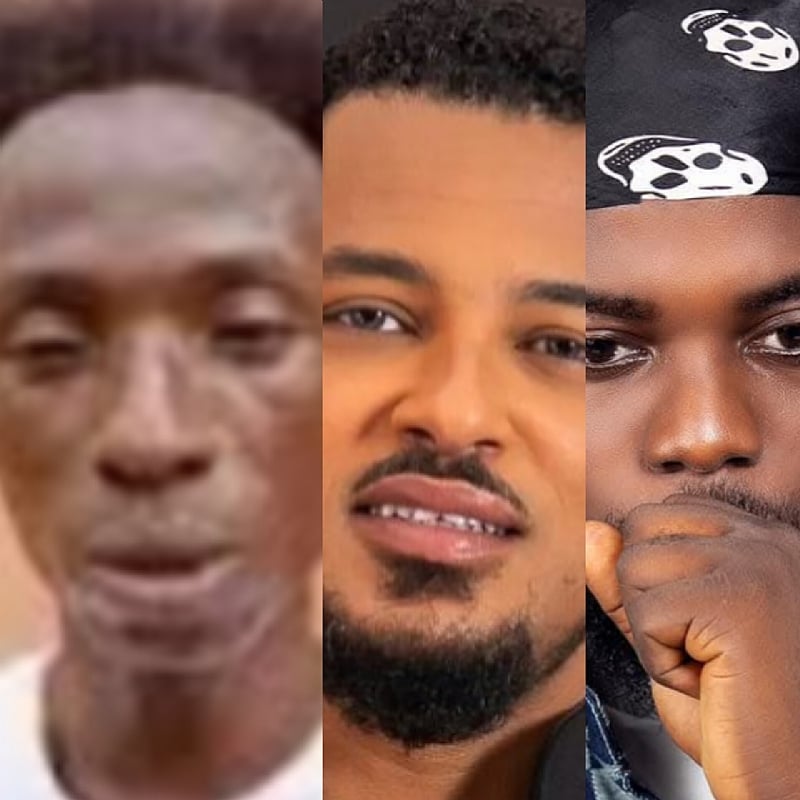The Ghanaian music scene is ablaze with controversy following the release of “Don’t Fall in Love,” a collaboration between artists Takum and Shatta Wale. The contentious point of the song lies in a specific lyric that compares the perceived attractiveness of Ghanaian actor Van Vicker to musician Patapaa, contingent on financial status. The line, “If I have money, ladies see me as Van Vicker. But if I don’t have money, ladies see me as Patapaa,” has ignited a firestorm of debate and drawn the ire of Patapaa, who considers the comparison derogatory and damaging to his image. The lyric implies that Van Vicker represents a desirable, affluent image, while Patapaa represents the opposite, suggesting that his appeal is inversely proportional to financial success. This comparison has struck a nerve with Patapaa, sparking a public feud and threatening legal action.
Patapaa’s response has been swift and indignant. Taking to social media platforms, he has publicly denounced Takum and demanded the immediate removal of the song from all digital distribution channels. He has given Takum a one-week ultimatum to comply, threatening legal repercussions should the song remain available. Patapaa’s vehement reaction underscores the perceived gravity of the insult. He argues that the lyric not only disparages his appearance but also undermines his brand and professional standing. This incident highlights the sensitivity surrounding public image and reputation, particularly within the competitive landscape of the music industry. Patapaa’s insistence on the song’s removal demonstrates his commitment to protecting his brand and challenging what he perceives as disrespectful and damaging content.
This latest controversy is not an isolated incident for Patapaa. He has a history of publicly confronting fellow artists whom he believes have shown him disrespect or undermined his work. Previous clashes with prominent figures in the Ghanaian music scene, including Sarkodie and Shatta Wale, demonstrate a pattern of Patapaa defending his artistic integrity and demanding recognition of his contributions to the industry. These recurring conflicts suggest a broader tension within the Ghanaian music scene, where artists may feel the need to actively protect their image and reputation against perceived attacks. Patapaa’s willingness to publicly confront established artists also highlights his own confidence and refusal to be silenced or marginalized.
The public reaction to the controversy has been divided. Some fans support Patapaa’s stance, agreeing that the lyric is offensive and disrespectful. They argue that artistic expression should not come at the expense of another individual’s reputation and that Takum crossed a line by using Patapaa’s name in such a negative context. This segment of fans emphasizes the importance of respecting fellow artists and upholding professional conduct within the industry. Conversely, other listeners view the lyric as harmless creative expression, suggesting that Patapaa is overreacting. They argue that the line is intended as a playful comparison, not a malicious attack, and that Patapaa should not take it so personally. This difference in opinion highlights the subjective nature of interpreting artistic content and the varying thresholds for what constitutes offense.
Adding another layer of complexity to the situation is the involvement of Shatta Wale, a prominent figure in the Ghanaian music scene. As a featured artist on the track, his association with the controversial lyric inadvertently draws him into the conflict. Despite his prominent role in the song, Shatta Wale has remained silent on the matter, choosing not to publicly address the controversy or offer support for either side. His silence leaves room for speculation regarding his stance on the issue and his relationship with both Patapaa and Takum. This lack of comment also underscores the potential ramifications of taking sides in a public dispute, particularly within a tightly knit music community.
Patapaa’s management team, One Corner Management, has issued a formal statement reinforcing his position and issuing a final warning to Takum. The statement emphasizes the potential legal consequences of defamation and the damage inflicted on Patapaa’s brand. They reiterate the demand for the song’s removal and encourage a focus on individual talent and creativity rather than resorting to disparaging other artists. This formal intervention by Patapaa’s management signals the seriousness of the situation and the potential for the conflict to escalate beyond a public exchange of words. Their emphasis on legal action underscores the potential legal and financial ramifications of defamation, particularly within the context of an artist’s public image and brand. This firm stance also highlights the role of management in protecting their artists’ interests and navigating complex industry disputes.














